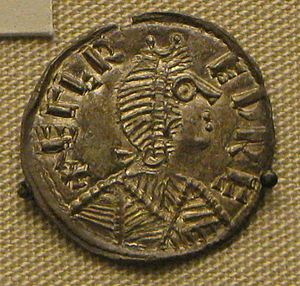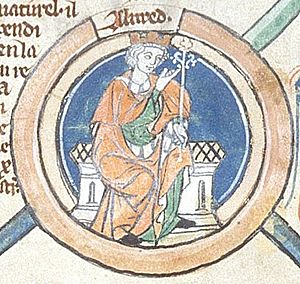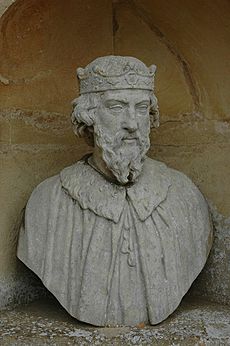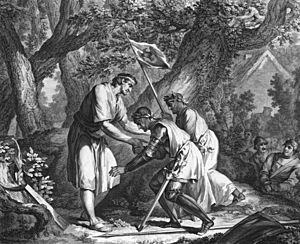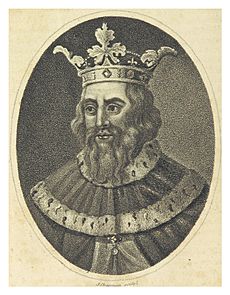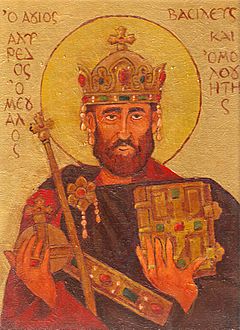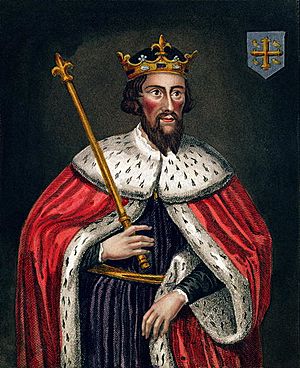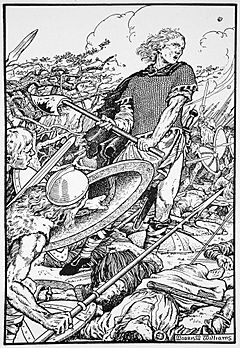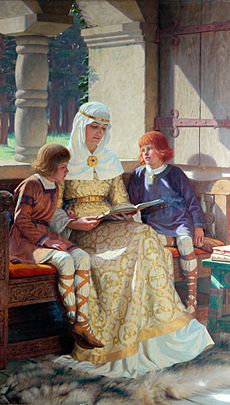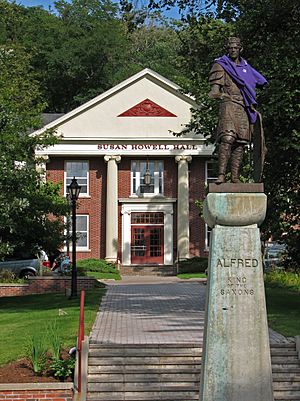Cultural depictions of Alfred the Great facts for kids
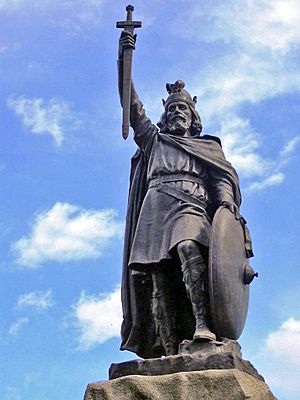
Alfred the Great was an Anglo-Saxon king of Wessex, a kingdom in southern England. He ruled from 871 to 899. During his time, fierce invaders called Vikings had taken over much of England. King Alfred bravely defended his kingdom and won a big battle against the Vikings at Edington in 878. This victory was very important for England's future.
Most of what we know about Alfred comes from a book called Life of King Alfred. A Welsh monk named Asser wrote it while Alfred was still alive. This book was the first life story written about an English ruler! Many years later, people started calling Alfred "the Great" because they saw him as an ideal Christian king. He became a hero who inspired many stories, artworks, and plays, especially during the Victorian era. This page shows you how Alfred has been shown in art, books, movies, and even video games.
Contents
Why is King Alfred so Famous?
Alfred was the youngest son of King Æthelwulf of Wessex. His father and three older brothers died before he became king in 871. For the first seven years of his rule, Alfred fought against the Vikings. He finally defeated the powerful Great Heathen Army at the Battle of Edington in 878 AD. After this, the Vikings settled in an area of eastern England called the Danelaw.
Alfred then made his kingdom stronger. He improved the army and built 33 'burhs', which were fortified towns. He also designed and built a small fleet of longships to protect against more Viking attacks. His children, Æthelflæd and Edward the Elder, later continued to take back land from Viking control. Alfred's reign is often seen as the start of the list of English monarchs.
Alfred's Focus on Learning and Law
King Alfred brought smart people to his court from different places. One of them was the monk Asser, who wrote Alfred's life story. Asser showed Alfred as a wise and good Christian ruler. Alfred's time as king was also important for learning. He had many books translated from Latin into Old English, the language spoken then. He believed everyone should be able to read important works.
Alfred also made changes to education. He wanted people to learn in English, not just Latin. He started schools to train future priests and government workers. This helped them make better decisions. He also created a new law code and started the Anglo-Saxon Chronicle. This was a collection of records that kept track of historical events in England.
How Alfred Became "the Great"
Even though Asser wrote about Alfred as a saintly figure, Alfred was never officially made a saint. However, later historians still wrote good things about him. In the 1500s, during the English Reformation, Alfred became a symbol for the new English Protestant church. People liked that he encouraged English over Latin.
Around this time, more than 600 years after his death, Alfred was first called "the Great." People admired his patriotism, his success against the Vikings, and his support for education and law. He became a hero who inspired many works of art and culture. During the time of Queen Victoria, Alfred was seen as the founder of the English nation. The name 'Alfred' even became popular, and Queen Victoria named her second son Prince Alfred.
Art and Sculpture: Seeing Alfred Through Time
We don't have any pictures of Alfred from his own time, except on his coins.
Artists started creating images of King Alfred mostly from the 1700s to the early 1900s. He was often shown as a symbol of England: a brave military leader, a smart scholar, and a fair judge. Many paintings showed famous stories about him, like Alfred disguised in the Viking camp or Alfred burning the peasant woman's cakes.
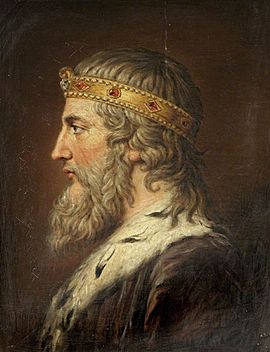
An 18th-century portrait of Alfred by Samuel Woodforde.
|
|||
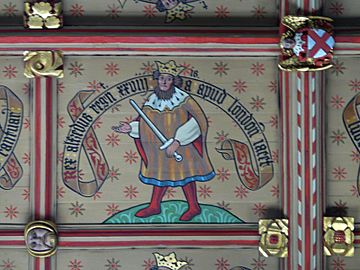
King Alfred painted on the ceiling of St. Mary's Church, Beverley.
|
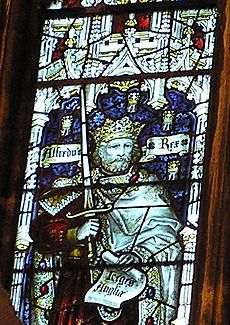
King Alfred the Great in a stained glass window at Bristol Cathedral.
|
||
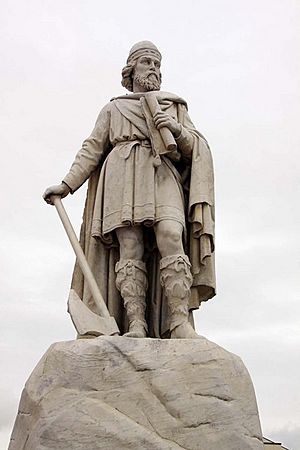
Statue of Alfred the Great at Wantage, Berkshire (1877).
|
Alfred in Books and Stories
King Alfred has been the subject of many historical books and fictional stories.
Historical Books About Alfred
Here are some early historical books that mention Alfred:
| Date | Title | Author | Notes |
|---|---|---|---|
| (1570 edition) | *Foxe's Book of Martyrs | John Foxe | |
| (1634) | *Life of Alfred | Robert Powell | |
| (1642) | *Life of King Alfred | Sir John Spelman |
Fictional Stories About Alfred
Alfred appears in many novels, often showing his bravery and wisdom:
| Date | Title | Author | Notes |
|---|---|---|---|
| (1723) | *Alfred | Sir Richard Blackmore | An epic poem about King Alfred, but also about the politics of the time. |
| (1801) | *Alfred | Henry James Pye | An epic poem. |
| (1801) | *Alfred | Joseph Cottle | An epic poem. |
| (1808—1834) | *King Alfred | John Fitchett (poet) | A very long epic poem (over 130,000 lines!) that took 40 years to write. |
| (1830) | *Sea-Kings in England: an historical romance of the time of Alfred | Edwin Atherstone | A historical adventure novel about Alfred's war against the Vikings. |
| (1861) | *A Chronicle of Ethelfled | Anne Manning | This story focuses on Alfred and his daughter, Æthelflæd. |
| (1886) | *The Dragon and the Raven, or The Days of King Alfred | G. A. Henty | A fast-paced story about a young man joining Alfred's fight against the Vikings. |
| (1901) | *The King's Sons: A Story of King Alfred's Boyhood | G. Manville Fenn | A children's novel about Alfred's younger years. |
| (1911) | *The Ballad of the White Horse | G. K. Chesterton | A long poem that shows Alfred as a divinely guided leader uniting England against the Vikings. |
| (1961) | *The King of Athelney | Alfred Duggan | A historical novel that mixes facts with popular stories, like the burning of the cakes. |
| (1964) | *The Namesake | C. Walter Hodges | A children's historical novel where King Alfred is a key character. |
| (1967) | *The Marsh King | C. Walter Hodges | Another children's historical novel. |
| (2004–2020) | *The Saxon Stories | Bernard Cornwell | A series of 12 historical novels. Alfred is shown as a religious but determined leader. These books were later made into the TV show The Last Kingdom. |
| (2008) | *Warrior King | Sue Purkiss | A children's novel. |
Alfred on Stage and Screen
Alfred has also been featured in plays, operas, and TV shows.
Plays and Operas About Alfred
| Date | Title | Composer/Writer | Type | Notes |
|---|---|---|---|---|
| (1740—1753) | * Alfred | music by Thomas Arne, words by David Mallet and James Thomson. | A musical play/opera | This work includes the famous patriotic song "Rule, Britannia!". |
| (1827) | *Alfred the Great; or, the Enchanted Standard | Issac Pocock | A light musical comedy | A musical drama in two acts. |
| (1837) | *Alfred the Great; or The Patriot King | James Sheridan Knowles | A drama |
Alfred in Movies and TV Shows
You can see Alfred in these films and television series:
| Date | Title | Format | Notes |
|---|---|---|---|
| 1969 | *Alfred the Great | A big movie | Directed by Clive Donner, with David Hemmings as Alfred. |
| 1971 | *The Raven and the Cross | A UK children's BBC TV series | This show was about Alfred's fight with the Viking leader Guthrum. |
| 1974 | *King Alfred | An episode of BBC's Churchill's People | Alfred is played by Alan Howard. |
| 2009 and 2015 | *Horrible Histories | A UK CBBC Children's TV series | Alfred is shown in funny sketches in this educational history show. |
| 2015 -2018 | *The Last Kingdom | A TV series based on The Saxon Stories | Alfred is played by David Dawson for the first three seasons. |
| 2015–2020 | Vikings | A History Channel series | Alfred appears from season 3 onwards, played by different actors as he grows up. |
Alfred in Video Games
Alfred also appears in several video games:
- In the 2018 strategy game Total War Saga: Thrones of Britannia, Alfred is the leader for the kingdom of Wessex.
- In the 2020 action game Assassin's Creed Valhalla, Alfred leads Wessex against the Vikings. He is a main character who secretly works to change a powerful organization.
- Alfred appears in the Crusader Kings strategy games (Crusader Kings II and Crusader Kings III). In these games, he starts as a nobleman before becoming king.
Education: Schools Named After Alfred
Many schools and universities are named in honor of King Alfred:
- The University of Winchester used to be called King Alfred's College.
- Alfred University and Alfred State College in New York are named after him. The local phone number even starts with 871, which is the year Alfred became king!
- The University of Liverpool has a special "King Alfred Chair of English Literature."
- King Alfred's Academy is a secondary school in Wantage, which was Alfred's birthplace.
- King's Lodge School in Chippenham, Wiltshire, is named because Alfred's hunting lodge might have been there.
- The King Alfred School in Highbridge is named due to its closeness to important historical sites.
- The King Alfred School in Barnet, North London.
- King Alfred's house at Bishop Stopford's School at Enfield.
Military: Ships Honoring Alfred
The Royal Navy has named one ship and two shore bases HMS King Alfred. One of the first ships of the US Navy was also named USS Alfred in his honor.


